Tomato plants can be attacked by a variety of pests and diseases that, if left unchecked, could destroy the entire crop.
To avoid the loss of most of your tomato plants, it’s essential to prevent infestations as much as possible, and act quickly as soon as you notice signs of distress.
The smartest thing you can do is to plan ahead and have different methods of organic pest control ready to use since it’s inevitable that sooner or later, your plants will be attacked.
Some of the most common insects that can infest tomatoes are nematodes, aphids, hornworms, cutworms, and flea beetles.
Sometimes, you might be tempted to use chemicals to treat infestations, but it’s best to avoid them, for many reasons.
Firstly, many insects, by now, are resistant to chemicals, so they would be ineffective.
Chemical products are also not always targeted, so they can cause direct damage not only to pests, but also to beneficial insects, weakening the ecosystem.
Also, many products are dangerous for pets, which could inadvertently feed on contaminated materials and get sick.
We listed the best methods and organic products to control pests in your tomato garden organically, with lesser harm to you or the environment!
- Related: Tomatoes in Organic Garden
11 Best Organic Pest Control for Tomatoes
1. Insecticidal Soap
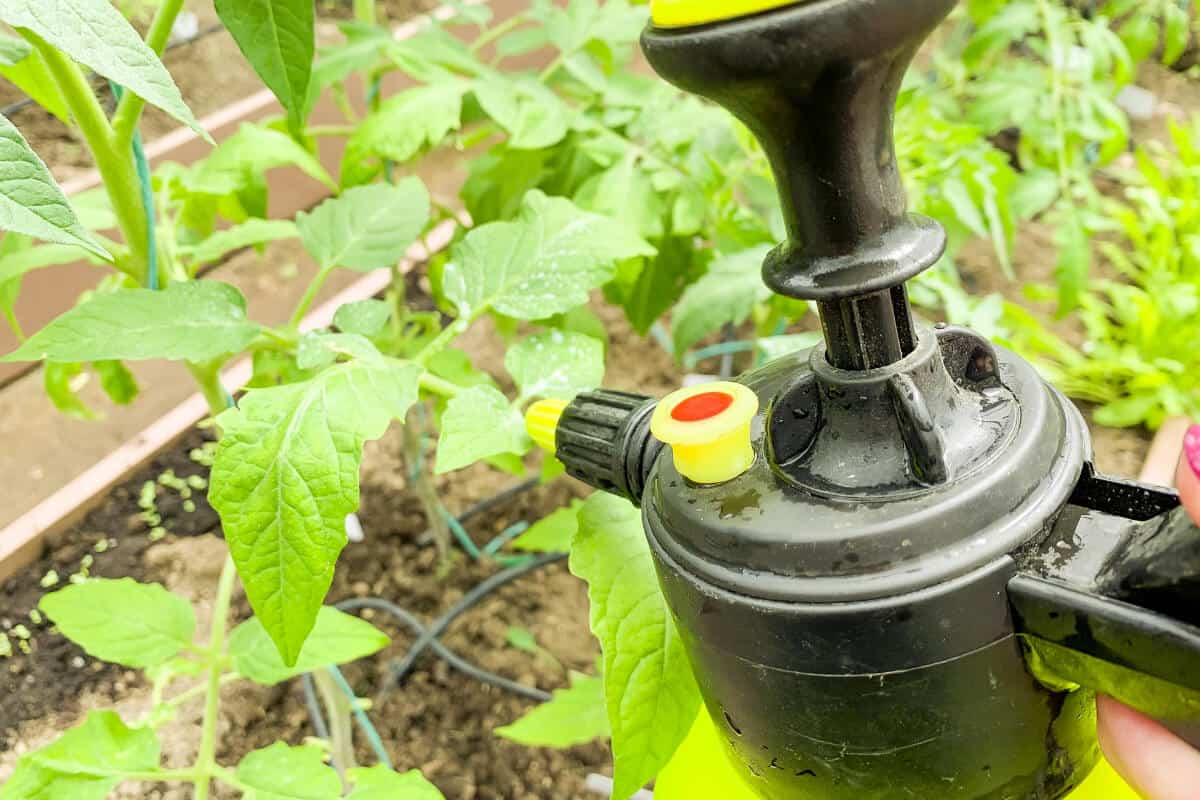
Soap has been used for countless generations to control pests. When applied, soap destroys insect eggs and larvae, both in the soil and on the plant.
It also kills soft-bodied adult insects. It’s particularly effective against aphids, since its slickness causes them to slide off the plant.
You can use any kind of soap that isn’t harmful for the environment, and it won’t create any issues for your plants. Choose a soap that is completely natural and biodegradable.
Avoid common hand soap, copper soap, dish or laundry detergent as they contain additives, such as fragrances and dyes, that can be harmful for plants.
You will simply need to spray the plants with soapy water. Just keep in mind that the effect wears off quickly, so the treatment needs to be repeated multiple times per day.
2. Horticultural Oils
Horticultural oils are effective against many pests. They exist in two kinds, petroleum-based and plant-based.
The petroleum ones are highly-refined, so that every compound that could be harmful to plants is removed.
The plant-based ones should be used with caution as they could sometimes burn the leaves. They can be made with soybean, cottonseed, or sesame oil.
The most popular is neem oil, which we will talk about more in-depth.
Horticultural oils are effective against eggs, larvae, and soft-bodied adult insects. They are non-specific, as they kill anything they are sprayed on.
They can be used to fight a common tomato pest—whiteflies. These are tiny flying insects that feed on tomato plants and release a sweet substance, honeydew, that attracts ants.
3. Neem Oil
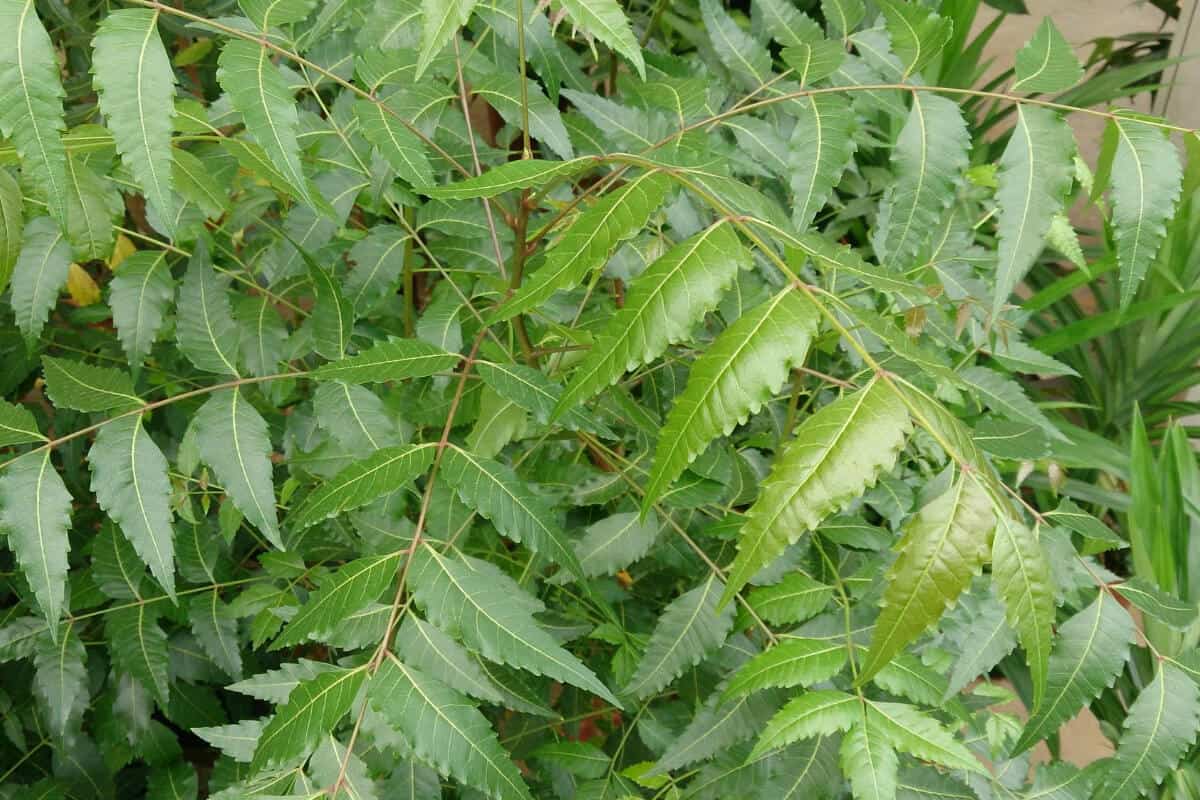
Neem oil is very popular, as its effectiveness is comparable to that of the best chemical products.
It’s a vegetable oil extracted from the plant Azadirachta indica. Its smell is not pleasant, but it doesn’t have any negative effects on humans, other animals, or plants.
It’s a repellent for aphids and a wide variety of other bugs. Neem oil is especially effective for young insects because the substances it contains block the early stages of development.
Neem oil is too strong to be used pure. It’s best to dilute it with water to obtain a 2% concentration or less. It’s also possible to add some natural soap to the solution.
This must then be applied on the plants in the evening, best if after sunset, as the sun would deactivate the active principle.
4. Natural Spray
Apart from oil-based products, you can use many different natural ingredients to make insect spray for tomato plants that will prevent infestations or repel insects.
You can easily make many of them at home, by using common ingredients found in your kitchen.
Vegetable oil, baking soda, vinegar, and hydrogen peroxide are all excellent in recipes for natural insecticide.
These products are enhanced by adding spicy pepper powder or cayenne pepper, which has the benefit of keeping away larger pests as well, such as birds and rats, without harming them.
Other natural sprays can be made by steeping different plants in water. For example, to keep away aphids and mites, try boiling rhubarb leaves for 20 minutes and spraying the resulting water on the plants.
For pests that feed on tomato leaves, use the water where you steeped chili peppers, onion, and garlic for 24 hours.
5. Beneficial Insects
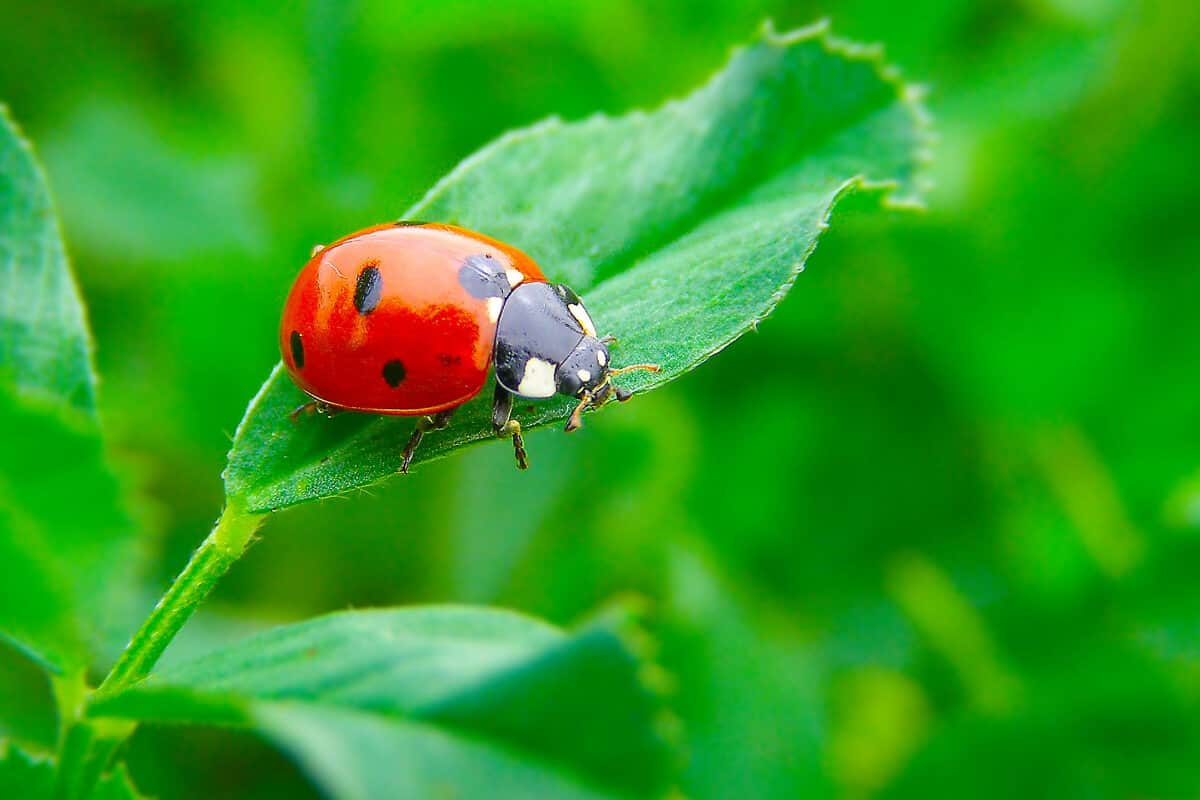
Many insects, not only are harmless to your crops, but have the positive effect of controlling the population of damaging pests.
The main ones are ladybugs and lacewings, which, amongst others, feed on aphids, whiteflies, and hornworms eggs.
Tomato hornworms are some of the most common tomato pests, which are difficult to spot because of their light green color.
If you see them, you can also remove them and keep checking every day for more.
To fight those insects that develop inside the soil, such as flea beetles, you can use particular nematodes that feed on them. These can also help control the population of those nematodes that attack tomato plants.
6. Natural Barriers
By spreading coffee grounds, eggshells, or diatomaceous earth around tomato stems, you can create a barrier that keeps cutworms and slugs out.
Cutworms look like caterpillars and will eventually develop into moths. They feed after dark and are particularly dangerous for young seedlings, as they can eat the whole plant in a single night.
Coffee grounds and eggshells are more effective if used in tandem. If you have enough, you can also surround the whole garden perimeter. However, keep in mind that you will need to renew it after every rainfall.
Diatomaceous earth is a natural sedimentary rock that is effective against any insect with an exoskeleton.
It can also be dusted on the leaves to prevent them from being attacked by leaf-eating insects, for example flea beetles. These insects that resemble jumping fleas attack many different crops.
They feed on every part of the plant and can completely destroy it, if not controlled. Diatomaceous earth is perfectly safe and it can be easily found online.
7. Bacillus thuringiensis
This bacterium is naturally present in the soil and is very effective against the larvae of many insects, especially cutworms and hornworms.
As it’s only useful in the early stages of development, you should try to identify the pest that is causing damage to your tomatoes as soon as possible and introduce this bacterium straight away.
Bacillus thuringiensis is one of the best insecticides available in organic agriculture, as it’s highly selective and specific.
This means that there’s no risk of impacting insects that are beneficial to your garden, as well as other animals.
There are a few different varieties of this bacterium that act on different pests, so check it’s the right kind before buying.
8. Sticky Traps
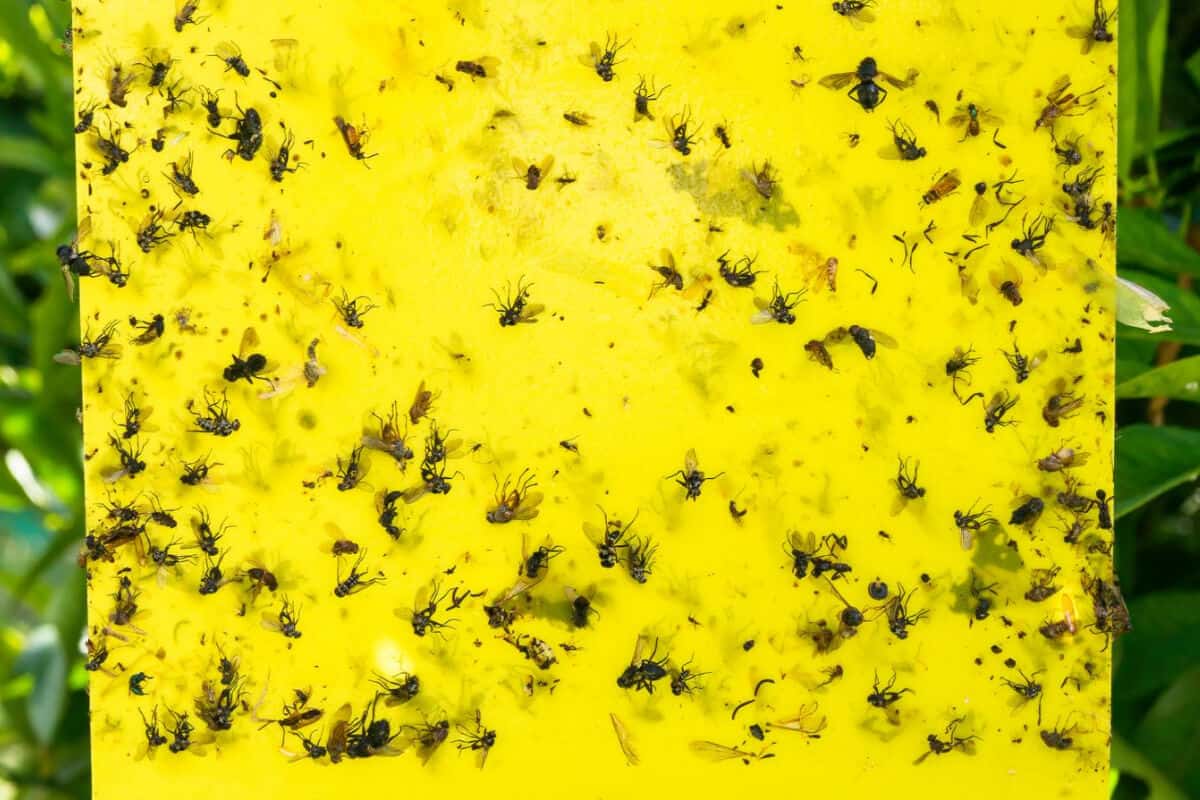
Sticky traps are usually made of cardboard and covered with a sticky glue that traps insects. Sometimes they also emit fragrances that lure the insects in.
Putting sticky traps around your garden can be effective against silverleaf whiteflies, flea beetles, spider mites, and aphid populations.
The downside is that they will not only work against the bugs you want to get rid of, but also other insects, as well as birds and snakes.
For this reason, they are best used only to monitor the extent of the infestation, which can then be treated with other methods.
9. Crop Rotation
Crop rotation is more of a preventive method, but we mention it here because it’s one of the most effective gardening techniques to protect your crops against pests.
By always alternating the crop you plant in a given area of your garden, you will ensure that fewer insects that prey on a certain plant will develop.
For this to be effective, you should avoid planting species from the same family year after year. This is because many insects that attack tomatoes can also feed on eggplants and peppers, for example, as they all belong to the Solanaceae family.
Crop rotation is the best method to prevent nematodes, for example. There are different species of nematodes that are very harmful for tomato plants.
They are particularly dangerous because they can spend the winter in the ground and attack the plants at the first signs of spring, and then it will be too late to do anything.
10. Pollinator Flowers
Planting plenty of flowers in your garden in-between the vegetables will encourage the presence of many beneficial insects.
It has been proven that a diverse ecosystem with a high number of different species is one of the most effective methods to have a healthy garden.
This is valid both for plant species and for the insects and other animals that live in and around your garden.
For example, some types of wasps that you can attract with flowers prey on hornworms and can help you control their population.
11. Companion Plants
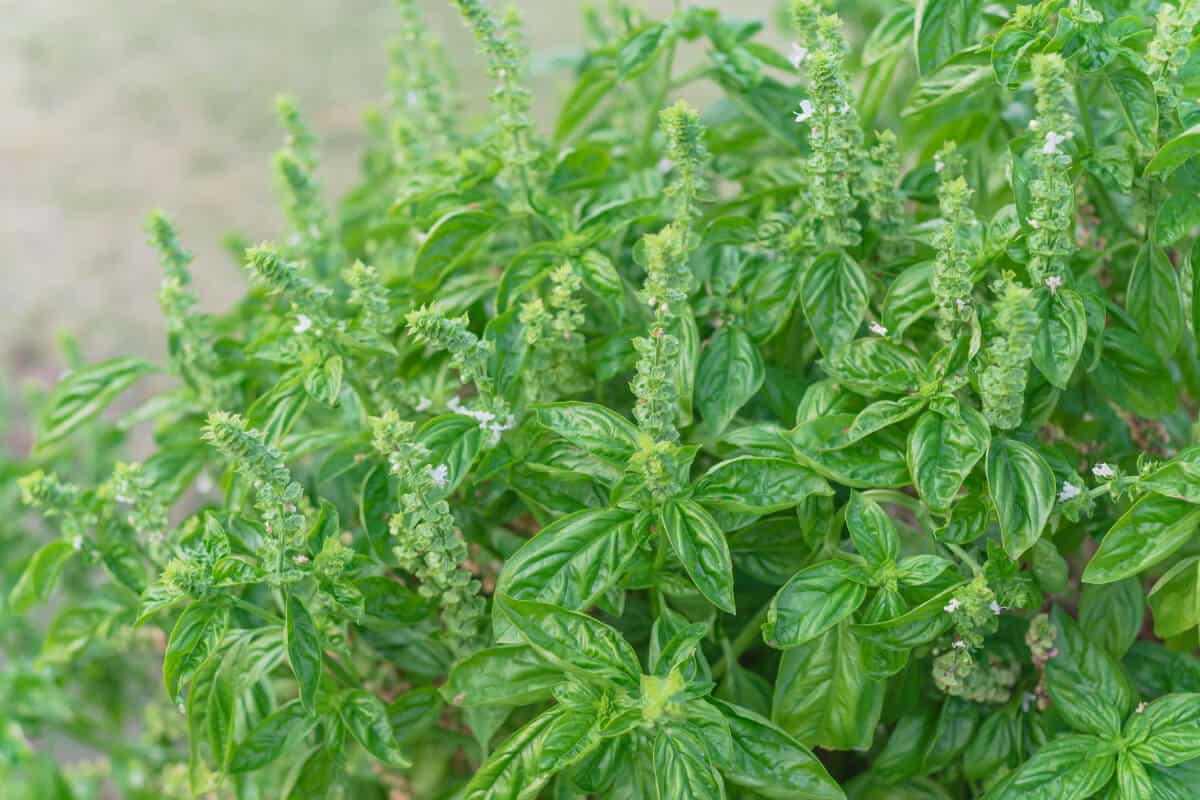
Some plants are perfect to grow next to tomatoes, as they will keep pests away.
For example, basil repels air-born pests, garlic does the same for pests found in the soil, and marigold keeps aphids and other flying pests away.
Moreover, adding plenty of variety has the effect of increasing the biodiversity of your vegetable garden, and therefore, its stability and resilience.
Last but not least, companion plants will also improve the taste of your tomatoes.
Other plants that keep pests away include beans, bee balm, borage, sweet alyssum, chives, nasturtium, mint, anise, onion, and parsley.
Best Organic Pest Control for Tomatoes Final Thoughts
Organic pest control plays a vital role in growing healthy tomatoes without the use of synthetic pesticides.
With the use of organic methods such as companion planting, natural predators, and homemade sprays, you can keep your tomato plants strong and pest-free.
Don’t let common pests like aphids, hornworms, and whiteflies ruin your tomato harvest!
Implementing these organic pest control strategies will not only protect your crop, but also benefit the environment by reducing chemical use.
Happy gardening!
Explore the world of organic gardening more by checking out these related articles:
Sources:

